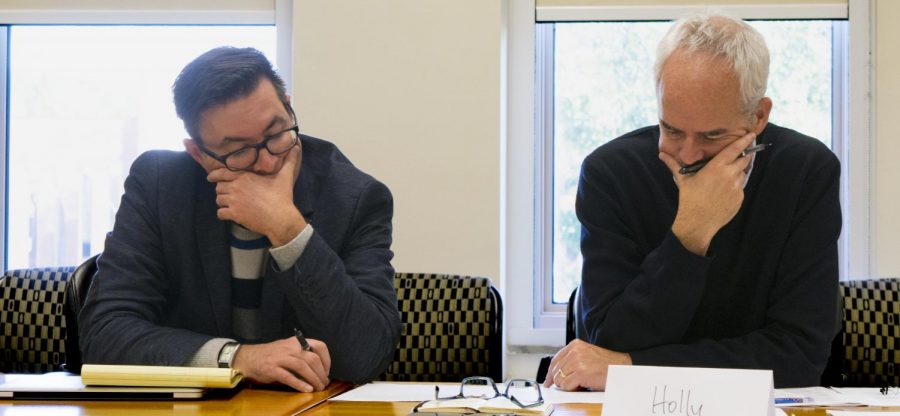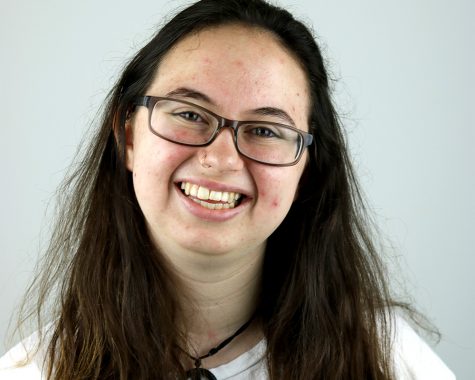Faculty Senate looks at solutions with shared governance, think tank
Brooke Schwartz | The Daily Eastern News
C. C. Wharram (left) is the director of the Center for the Humanities and a Faculty Senate member, and Donald Holly is an anthropology professor and and is also a senate member. The senate met Tuesday and looked at many resolutions, including one for shared governance and one to update the 360 review process for administrators.
October 17, 2018
The Faculty Senate had a full agenda Tuesday, which included looking at resolutions for shared governance, an updated 360 review process for administrators and a university think tank.
The shared governance discussion, which began in earnest at a senate meeting on Jan. 23, 2018, was started because of concerns from the Higher Learning Commission about communication between organizations on campus.
After proposing many different models and engaging in many different discussions, a couple of different solutions have arisen out of these talks.
To address the original HLC concern about communication, Todd Bruns, Faculty Senate chair and scholarly communication librarian and institutional repository director, initiated a monthly lunch meeting between the chairs of the involved committees, including the chairs of the Council on Academic Affairs, the Council on Graduate Studies and the Council on Teacher Education.
Jeff Stowell, senate vice-chair and psychology professor, said another concern has come out of what started as just a shared governance discussion.
In the draft proposal Stowell shared with the senate on Tuesday, he wrote, “Curricular bodies on campus (CAA, CGS, COTE) are not explicitly asked to consider the new program in the context of the university mission or the fiscal and personnel resources required.”
The proposal stated that these new programs, the ones that require Illinois Board of Higher Education approval, needed more faculty input when considering the allocation of resources and the alignment to Eastern’s mission.
Stowell said the senate constitution calls for them to have a consulting role on matters that have major effects on structure or staffing, which is why he said he thinks the senate should be more clearly charged with looking at these specific aspects of new programs that require IBHE approval.
Provost Jay Gatrell and his office already have new programs present on mission and resources, but Stowell proposed those presentations be brought back to the senate for discussion either through the Provost’s report or through the executive committee of the senate’s meetings.
The senate would then only submit a report on the programs they look at if there appears to be a problem with either mission or resource allocation.
Many senators liked this idea, and it was folded into a larger discussion about possible changes to the senate’s constitution.
Billy Hung, senate recorder and biological sciences professor, said putting this more specific role of senate in the constitution would be beneficial in many ways.
“One of the problems (Faculty Senate has), or (the senate) had, with previous years is some of (the senate’s) roles are not clearly defined and then people didn’t know what we were supposed to do versus what we were not supposed to do, and then when (senate) tries to do things we butt heads, we run into (other committees and organizations on campus),” Hung said. “I think a better clarification, in whatever format, is what I want.”
Stowell will bring a revised proposal, adding the shared governance idea into the senate constitutional changes proposal, to the senate’s Oct. 30 meeting, where both proposals will be more thoroughly discussed.
A more structured proposal of a university think tank was also discussed at the senate meeting.
The idea of a think tank, which would focus on macro ideas and trends in higher education and would look at Eastern’s future, was first discussed by the Workgroup No. 8 and 9 Review Committee and was later discussed in a Jan. 9 Faculty Senate meeting.
The senate decided to form a test version of this visionary group that would include four appointed administrative positions, two of which will be filled by Eastern President David Glassman and Provost Jay Gatrell, and four nominated faculty positions along with/or including a potential student position.
The senate will look for faculty members to nominate before its next meeting, and the think tank will have a three-year trial once it is created.
A proposal for an updated 360 review of administrators was drafted by Teshome Abebe, senate member and economics professor, and it was looked at by the senate.
The idea to update the review process was passed by the Faculty Senate on Nov. 17, 2015 and was recently looked at by Glassman, who said he was favorable of the idea.
The current system employs a survey, which allows the taker to identify strengths and weaknesses of the person being evaluated, which will then be submitted to the next highest administrator.
Abebe wrote in his proposal that this process, while being efficient and can allow direct input from the person being supervised to the supervisor of their supervisor, it can lead to suspicion from faculty as they have no say in the evaluation of the dean, the president or the vice president.
Abebe submitted six potential proposals with the recommendation to pick one or two and have Glassman choose the final solution.
The possible proposals ranged from an open comment time when reviewing administrators to creating a committee of faculty to have input in the assessment of administrators.
The one of the two proposals voted to recommend to the president was listed as “continue using the current system but allow all faculty to have input in evaluating administrators above chair levels (to include the relevant dean).”
The other proposal that was voted to be recommended was to “implement a different form of evaluation, which allows input for faculty at all levels.”
These two proposals will now go to the president to be looked over and implemented as he thinks will work.
Two senate bylaw changes were also approved at the Oct. 16 meeting.
The first scratched the current bylaw language that stated faculty members could only serve on one committee.
The second combined senate subcommittees, specifically the elections and nominations committees and the student-senate and staff-senate committees, the later of which will be called the senate relations committee once combined.
Brooke Schwartz can be reached at 581-2812 or at [email protected].




















































